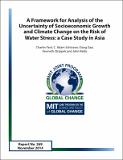A Framework for Analysis of the Uncertainty of Socioeconomic Growth and Climate Change on the Risk of Water Stress: a Case Study in Asia
Author(s)
Fant, C.; Schlosser, C.A.; Gao, X.; Strzepek, K.; Reilly, J.
DownloadMITJPSPGC_Rpt269.pdf (11.54Mb)
Metadata
Show full item recordAbstract
The sustainability of future water resources is of paramount importance and is affected by many factors, including population, wealth and climate. Inherent in how these factors change in the future is the uncertainty of their prediction. In this study, we integrate a large ensemble of scenarios—internally consistent across economics, emissions, climate, and population—to develop a risk portfolio of water stress over a large portion of Asia that includes China, India, and Mainland Southeast Asia. We isolate the effects of socioeconomic growth from the effects of climate change in order to identify the primary drivers of stress on water resources. We find that water needs related to socioeconomic changes, which are currently small, are likely to increase considerably in the future, often overshadowing the effect of climate change on levels of water stress. As a result, there is a high risk of severe water stress in densely populated watersheds by 2050, compared to recent history. If socio-economic growth is unconstrained by global actions to limit greenhouse gas concentrations, water-stressed populations may increase from about 800 million to 1.7 billion in this region.
Date issued
2014-11Publisher
MIT Joint Program on the Science and Policy of Global Change
Citation
Report 269
Series/Report no.
MIT Joint Program Report Series;269